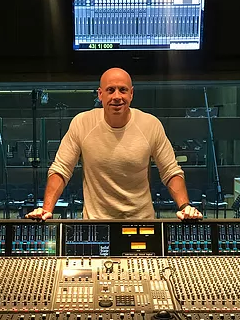Featuring insightful and eye-opening interviews with artists, managers, songwriters, executive producers, and more, “Quit the Chaos. Keep the Gig,” is a new series that takes a look at how substance use affects everyone in the music & entertainment industry.

With experience working in genres as diverse as arena rock, power pop, electronic, and orchestral scores, Kitt Wakeley is a versatile composer, songwriter, producer, and performer. His latest project is his recently released orchestral album, Midnight in Macedonia.
In conversation with Ron Roecker, Kitt discusses his experiences working and living with people struggling with substance abuse and how it has personally motivated him to help others fight addiction.
Have you had any experiences with substance abuse by a team member, partner or band mate that affected your own livelihood or ability to do your job?
Kitt: The sad and unfortunate answer is yes. One of my former business partners became addicted to opioids after a back surgery, which lead to the abuse of alcohol and other substances. To watch the unraveling of his life, his wife leaving him and kids disowning him was agonizing. My business partners and I paid for him to attend a well respected treatment center, but unfortunately, he was not ready to accept a new journey after he completed his treatment. Over time, the negative consequences that come with opioid and alcohol abuse took their toll. He has basically lost everything he worked so hard for, including his ownership interests in our company. He is a very angry person, still addicted and refusing to see that he has a problem.
The second unfortunate experience was with my stepdaughter. When she started college she made the poor choice of trying opioids at a party. Over time, she became so addicted that she was abusing any drug available, including heroin. To see her fall this far in life was a humbling reminder that it doesn’t matter what someone’s background may be. Substance abuse can become a detrimental factor in anyone’s life. We were blessed to see our daughter seek treatment and watch her blossom into the young lady we had hoped that she would become.
The third and unfortunate circumstance was my little brother. We grew up in the same household with the same rules, but somehow we took different paths. At the age of 12 he was abusing alcohol on a regular basis and by the time he was in high school, he abused numerous drugs on a regular basis. He’s 40 years old now, been arrested too many times to count and lives in an extremely poor conditions. However, I’m proud of his journey the past few years. He’s had the same job for 3 years and has reduced his substance abuse tremendously. I wished he wouldn’t use any substances, but I’ll take any progress.
Finally, I’ve been in several situations when I was in a band, opening for some pretty big names. It was disheartening to admire someone, only to interact with them, see the way they behaved while high, and think, “What a freakin’ idiot!” Some had completely lost their dignity backstage. They were a shell of themselves and in no way were the same people that I saw in magazines, television interviews and other media. There were several realizations that I had when going through this, which made me realize that getting a big record deal may not be as great as people think. Some of them have rebounded extremely well, while others are either dead or completely lost in life.
Why do you think there is such wide-spread substance use among the creative community? Do you think musicians have to “suffer” to make great art?
Kitt: This is a perplexing phenomenon. As far back as Beethoven and Schumann, one an alcoholic and the other a common abuser of mind altering drugs, musicians and substance abuse almost seem synonymous.
Musicians have a unique professional environment that most do not. They are often clubs, with younger peers, and on the road, and the influence from others can be overwhelming. I have to say that in my experience, many of the decision makers are often abusers as well, therefore, it’s easy for a musician to go along with the people that can make or break their career.
Next, you have to take into consideration that most musicians don’t have the typical structured life that so many other professions have. There is a direct correlation between having a lack of structure and the propensity to abuse alcohol or drugs. There are definite exceptions to the rule, but structure can minimize the risks.
Many musicians start finding success in their younger years when they feel they are bulletproof and lack the personal and professional maturity to realize the detriment that it will lead to.
Of course, I believe there is also the “artist” factor. For the most part, artists are more creative, free thinking individuals. They can be a bit more liberal in their ideologies, and therefore are possibly more forgiving of taboo habits such as alcohol or substance abuse.
What substance abuse resources are you involved with that are tailored specifically to the music community? Why do you support MusiCares?
Kitt: My wife and I are actively involved with our own substance abuse treatment center and we support two sober living organizations. I referenced the correlation between structure and substance abuse earlier. The success of people who seek treatment, who also transition to a sober living is obscenely better. If someone can maintain a responsible, structured life for at least a year in a structured sober living, the relapse rate is extremely low. Knowing this, my wife and I try to support these organizations.
One of the many reasons I support MusicCares is that they have such a heavy focus on, not only substance abuse, but mental health treatment as well. Most often, substance abusers have experienced some kind of trauma or suffer from depression or anxiety. MusicCares understands these circumstances and is dedicated to treating the addition as a whole, not just the symptoms. They don’t merely support any treatment center or program. It must meet strict standards for success. They do what’s necessary to help artists.
Learn more about Kitt Wakeley.
Ron Roecker is an award-winning writer, as well as music/entertainment and brand marketing expert. His career includes Vice President of Communications & Artist Relations for the GRAMMY Awards, as well as a music/entertainment spokesperson for brands and media outlets including Nestle, Live Earth, Mattel, CNN, MTV, Entertainment Tonight, BBC, Today Show, Rolling Stone and more. Ron is a keynote speaker who talks about business lessons from Hollywood to Public Speaking and Crisis Management. For more information, visit www.bedifferently.com.
Evo Health and Wellness is an outpatient addiction treatment program that respects where you are and where you want to go. Clients set goals that work for them, whether they include complete abstinence or moderation. Evo sees success as lasting change in the client’s life, including physical health, movement towards personal goals, and their sense of connection and purpose. Evo’s program integrates psychotherapy, psychiatry, life coaching and somatic therapy. Learn more about why Evo works for Entertainment professionals.
